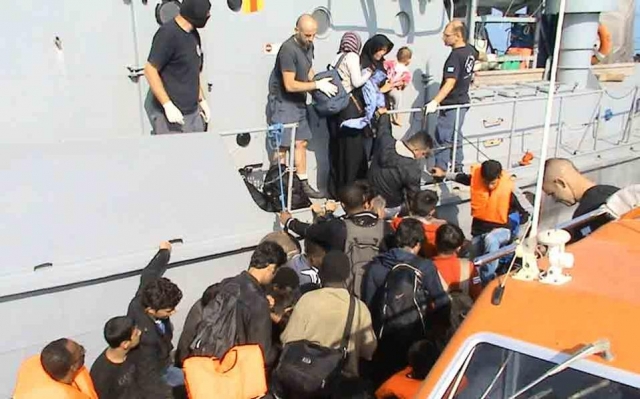photos - Kathimerini newspaper
Traffickers call "river" the sea that separates Dikeli in Turkey from Lesvos, the newspaper "Kathimerini" reveals. The distance is only 8 miles, but in order for the boats to appear safer, illegal immigrants are lied to that they cross a river, not the open sea. The price for every illegal immigrant varies between 1,000 and 3,000 dollars. Thousands of dollars for "a ticket" is the amount paid by those who travel in a small inflatable boat, 5-6 metres long, packed with 30-40 other people.
One of the transported people performs the duties of a guide after the traffickers show him how to operate the boat. The route runs normally at night, between 3 and 6 a.m., when a north wind blows possibly because it helps the trip to Mytilene. The use of lifebuoys is prohibited because it reduces the capacity of the boat.
The price rises by 1,500 to $ 2,000 when the group is accompanied by a guide who is part of the traffickers’ group. And this is so because it is assumed that the guide’s presence increases the likelihood of immigrants reaching the Greek coast.
However, the reality is quite different. For instance, the small inflatable boat that overturned in March near Mytilene was operated by a 16-year-old Turk! He has not been found yet just like one of the other passengers in the boat. Seven other Syrians were found dead. The people who survived testified that when the boat started leaking, the under-age boat driver went into an epileptic shock.
The coast guards have a slang word for this type of boats: they call them “wedges” and depending on the engine’s horsepower, these boats can travel 50 or 60 miles per hour.
 The Turk driving the boat, who was arrested near Mytilene, testified that after his return to Turkey he was supposed to receive $ 3,000 for transporting 11 emigrants. The number of confiscated trafficking boats is increasing rapidly. Port warehouses are no longer enough as many of the boats were confiscated and taken to the detention centre, currently being built in Moria.
The Turk driving the boat, who was arrested near Mytilene, testified that after his return to Turkey he was supposed to receive $ 3,000 for transporting 11 emigrants. The number of confiscated trafficking boats is increasing rapidly. Port warehouses are no longer enough as many of the boats were confiscated and taken to the detention centre, currently being built in Moria.
Recently, the groups of Turkish traffickers have increased a lot, exploiting the lifesaving needs of the Syrians to flee the war zone. A source of the Coast Guard in Mytilene informed Kathimerini newspaper that the Syrian refugees have money and can pay more to enter Greece compared to immigrants from Afghanistan or Pakistan.
“They are selling everything they have in their homeland to travel to Western Europe. They are ready to do everything. Traffickers raise the tariff and increase their profits," said a Coast Guard officer for Kathimerini. For example, the Syrians who were aboard a luxurious yacht that sank in early May at 4.5 miles north of Samos (more than 20 people died) paid $ 5,000 each to travel to Italy. According to the evidence, the Coast Guard found Syrian refugees in trafficking boats carrying laptops with them as well as lots of money.
The debriefing procedure (testimonials by arrested foreigners), involving employees of Frontex, shows that foreigners (mainly Syrians) found on the northern shores of Mytilene, usually depart from Istanbul. Their transport is organized by travel agencies known as the "showcase" of human traffickers in Turkey. The traffickers provide the people with a shelter in apartments in Istanbul, and afterwards transport them to the coastal towns of Aivali and Dikeli. The 8 miles separating Turkey from Greece are passed the very same night.
Never mind if a strong wind blows.
The night patrol of the Coast Guard boat begins at 11 p.m. from the port of Mytilene and ends the next morning. The speedboat runs along the coastline bordering with Turkey, covering a distance of 80 miles.
Just like all other patrol boats, this one is armoured too and "capable" of standing against the Turkish smugglers. The Area of Responsibility of the four-member crew is the sea area southeast of the island, i.e. close to the airport.
According to crew members, in this area, boats with illegal immigrants are often found as the lights of the airport help them to orient themselves. Here's what a member of the Coast Guard told Kathimerini, "We are moving along the coastline to scare the traffickers. However, we never chase them away.”
During the last few weeks, within Frontex, a crew of the Romanian Coast Guard has been participating in patrolling. As for the weather conditions, a crew member explains: "When a large number of immigrants gets together on the Turkish coast, the traffickers send them to Greece, even if the winds are very strong, over level 6 of the Beaufort scale. Saving them in such conditions is very difficult…”
The detained foreigners are brought to the Centre for Initial Intake in Moria. The centre is run by the police. As explained by an officer of the Coast Guard, the centre has a web page, which provides information about the location, time of detention of the foreigners and the procedures for applying for asylum.
Today detained in the centre are 90 foreigners, among them families with young children. After completion, the centre will be able to accommodate 250 people. Next to it, another centre is being built to host another 750 people.
70% of the detainees are Syrians, who are issued a six-month residence permit. In the centre, they take photos of the Syrians as well as fingerprints, the detainees give testimony to Frontex members on the terms for their illegal transportation into the country. The other detainees are mainly Africans who stay there for 20-25 days.